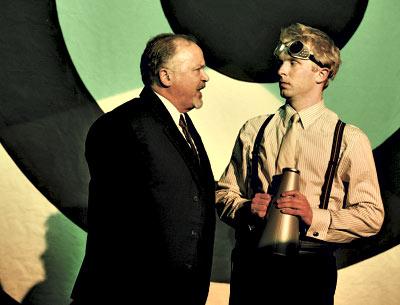Stoppard’s ‘Travesties’ At Bay Street

Revolution, art, and puns by the dozen mark the premiere of Tom Stoppard’s “Travesties” at the Bay Street Theater in Sag Harbor this week. In the play, Henry Carr, an English consular officer played by Richard Kind, tells of his relationships with James Joyce in the midst of writing “Ulysses,” Tristan Tzara as the Dadaist movement picked up speed, and Lenin at the start of the Russian Revolution. Carr’s life intersected with these big leaguers of the 20th century during World War I in Zurich — or so he claims: Carr’s account includes “accurate memories and sometimes inaccurate ones,” says Michael Benz, who plays Tzara, the nihilist poet.
The play showcases Mr. Stoppard’s innovative writing style as he constructs dialogue and plot that highlight the politics and philosophy of the three 20th-century leaders. The play’s farcical nature and abundant wordplay steers “Travesties” through the waters of Marxism, Dadaism, and Modernism, ultimately pointing to questions of art, politics, art in politics, and politics in art. “Travesties” incorporates Oscar Wilde’s “The Importance of Being Earnest,” bouncing off Wilde’s comedy, mimicking it, and adding to it. Mr. Benz explained that “the play has got a little bit for everybody. There’s the play within a play. There are magic tricks interspliced with soliloquies on the essence of what it is to be an artist.” He laughed, adding, “And I wear a monocle.”
Also appearing in “Travesties” are Carson Elrod as Joyce, Andrew Weems as Lenin, Aloysius Gigl, Isabel Keating, Julia Motyka, and Emily Trask.
The high jinks and hilarity of the production are written into the script — pies in the face, striptease, singing, dancing, adroit rhetoric — but Judith Dolan, the play’s costume designer, emphasized how Gregory Boyd, the director, especially brings the playfulness of the production to life with a balance of attention to performance and design sensibility. She described working with Mr. Boyd as “so much fun. He is always inventing, and so successfully.” Mr. Benz agreed. “Greg is not just a master of the theater and directing, but he’s a master of Stoppard as well.”
Ms. Dolan describes the costumes of the play as “vintage, as well as theatrical. Not Halloweenish, but flippant.” The costumes function as a historical representation of clothing in 1917, but also stitched into them are the ideologies of their wearers. The process of inventing the costumes included “looking at the culture and art of the period as well as what people were wearing in fashionable circles. The characters come from fashionable backgrounds with a real concern for how they look all the time, which makes it fun for when they let their hair down,” Ms. Dolan said. To incorporate the characters’ beliefs into the costumes, she would brainstorm with a collage for each character, very much in the spirit of Dadaism. The collages were satirical, a play on words, and often personal to Ms. Dolan herself.
The costume designer mentioned that each character has a unique identity and style as an artist, making the most salient feature of the play “the joy that it brings to language and the idea of different kinds of artists that exist.” In order to embody these “artists and their language in costume” she said she worked to make Tzara’s clothes “represent the new sensibility of improvisation at the time, with light fabric so as not to confine the actor’s body.” Lenin, “who wasn’t an artist but used images for propaganda,” is often dressed in black and white along with his wife. To capture the “crazy collage of words that Joyce presents, every time he comes in, he always is mismatched.”
Ms. Dolan worked with Mr. Boyd on two productions of “Travesties” prior to this one. She explained that while they would start out recreating the last production, “with a new cast, new things happen — it is the different charm of the actors.” Mr. Benz said they are focused on having fun and not getting “bogged down,” so that they can “maintain clarity of speech, keep it pacey, and find the joy in the play.”
“Travesties” will be staged Wednesdays through Saturdays at 8 p.m., Sundays at 2 and 7 p.m., and Tuesdays at 7 through July 20. Tickets start at $54, with $30 tickets available for those under 30, and free admission to the Sunday matinee for high school and college students.
